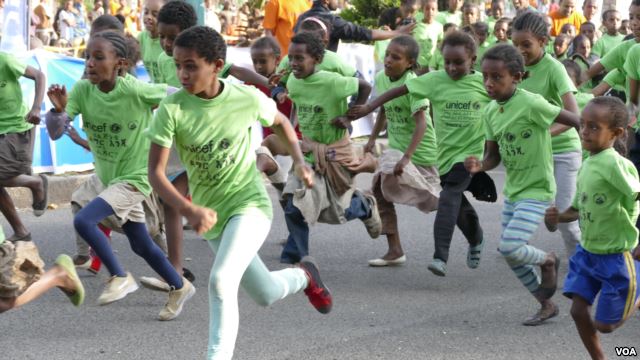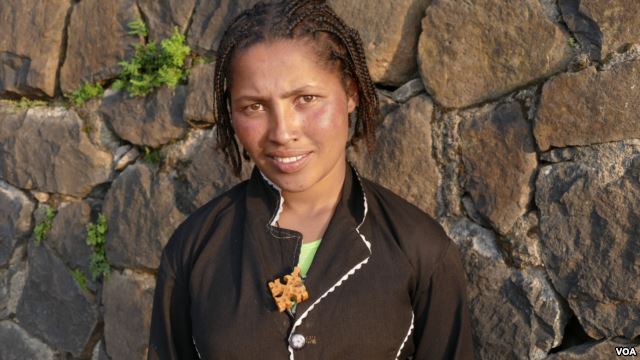 Children participate in a running event that's part of an awareness campaign to change attitudes and prevent child marriages, in Gondor, Ethiopia, September 2015. (M. van der Wolfe / VOA)
Children participate in a running event that's part of an awareness campaign to change attitudes and prevent child marriages, in Gondor, Ethiopia, September 2015. (M. van der Wolfe / VOA)
By Marthe van der Wolf
September 21, 2015
GONDOR, ETHIOPIA — Thousands of girls in the Horn of Africa are forced to marry although they are underage. The local government in Gondor, Ethiopia, and UNICEF are organizing large awareness campaigns to change the attitude of rural communities.
Sixteen-year-old Hibste Abebayehu, from the town of Gondor, was about to be married to a 28-year-old man when she was just 13. Last year, her parents tried again to marry her to another man.
Hibist said her parents did not even tell her about the marriage, but her friends overheard the arrangements and informed her.
She said when she heard, she immediately reported it to the school principal and to the lead teacher of the girls’ club. They spoke to the police. After they negotiated with her parents, they managed to cancel the marriage arrangements.

Sixteen-year-old Hibste Abebayehu has battled against being married to older men since she was just 13, and she is continuing her education, in Gondor, Ethiopia, Septmber 2015. (M. van der Wolfe / VOA)
Awareness interventions
The girls club that Hibste joined in school is a place where information is provided to girls about child marriage through awareness interventions. Especially for rural communities, child marriage is the social norm. The local government says that raising awareness and changing the attitude of the community is the biggest challenge.
The police, religious leaders and development partners such as the United Nations Children’s Fund are involved in trying to change the mindset about child marriage and eliminate all forms of child marriage by 2025.
UNICEF program worker Zemzem Shikur said child marriage has several consequences for the girl’s life.
“The first one is, easily they are forced to drop out from school, which shapes their destiny to be a housewife or to be in a very vulnerable situation,” said Shikur. “The other one is the health consequence. They do not get treatment easily, and they may not have information on where to get services.”
One in five girls in Ethiopia are married before the age of 18. In Gondor, a northern region, almost half of the underage girls are married, even though the legal age is set at 18.
Changing attitudes
Hibste feels lucky to have been rescued. She said many of her friends already are married. She said the thinking in the community is to marry off children at a very early age, since they do not see why girls should get an education or how they can become somebody.
One of the awareness campaigns in Gondor features an afternoon of musical performances on the main square. The event attracts large crowds and the message appears to get through to the audience of mostly boys. They say they agree girls should not get married before the age of 18.
Solomon Assefa is one of them. He said girls first need to be physically ready to get married, and that they then have to be educated so they can work toward what they want to become.
Hibste is now in 8th grade. She hopes her parents will allow her to attend university if she keeps receiving good grades.
Fourteen-year-old Abebe Ayele was less fortunate. She lives in a village an hour outside Gondor, was forced into a marriage last year and now has a six-month-old baby. She said it is difficult to deal with the new attitude from her peers.
She said everyone was gossiping about her when she was pregnant and it gave her psychological problems.
Abebe has registered for school again, but is not sure she can attend, as she does not have the funds to look after herself and her baby.
—
Join the conversation on Twitter and Facebook.

























